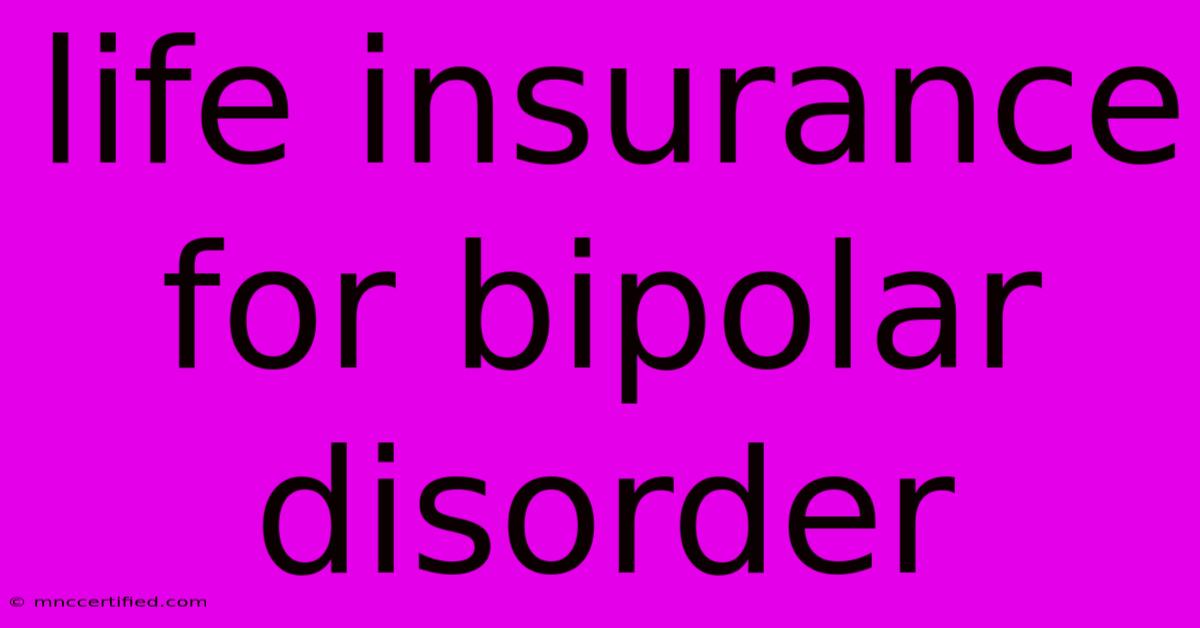Life Insurance For Bipolar Disorder

Table of Contents
Navigating Life Insurance with Bipolar Disorder: A Comprehensive Guide
Living with bipolar disorder can be a challenging journey, filled with ups and downs. It's essential to have a comprehensive plan in place to secure your future and safeguard your loved ones. Life insurance can play a crucial role in this plan, providing financial security for your family in the event of your passing. However, obtaining life insurance with bipolar disorder can present unique hurdles. This comprehensive guide will equip you with the knowledge and strategies to navigate this process effectively.
Understanding the Challenges
Bipolar disorder, also known as manic-depressive illness, is a mental health condition characterized by extreme mood swings. Insurance companies may perceive this condition as a potential risk factor, making them hesitant to offer coverage or charging higher premiums.
Here's why:
- Increased mortality risk: Individuals with bipolar disorder may have a higher risk of premature death due to factors like suicide, substance abuse, or health complications associated with the illness.
- Treatment costs: Ongoing medical expenses related to bipolar disorder management can be significant, adding to the perceived financial burden for insurance companies.
- Uncertain future: The unpredictable nature of bipolar disorder can make it difficult for insurers to assess long-term risk.
Navigating the Application Process
Despite these challenges, obtaining life insurance with bipolar disorder is possible. Here's how to approach the application process:
- Be honest and transparent: Disclose your condition openly and accurately. Be prepared to provide detailed information about your diagnosis, treatment history, and current medications.
- Provide thorough documentation: Offer medical records, therapist reports, and any other documentation that demonstrates your stability and responsible management of your condition.
- Showcase your stability: Emphasize your consistent adherence to treatment plans, good overall health, and positive lifestyle choices.
- Choose the right policy type: Consider a guaranteed acceptance policy if you have concerns about being approved. These policies often come with higher premiums but offer greater peace of mind.
- Shop around: Compare quotes from multiple insurance companies to find the most competitive rates.
Strategies for Success
Here are some additional tips to increase your chances of obtaining favorable coverage:
- Consult with a financial advisor: A financial advisor can guide you through the complexities of life insurance options and help you choose a plan that fits your needs and budget.
- Consider a shorter term: A shorter-term policy may be more affordable and easier to secure, especially if you are concerned about immediate financial security.
- Look for specialized programs: Some insurance companies offer specialized programs tailored for individuals with pre-existing conditions, including mental health disorders.
Key Considerations
- Disability insurance: Consider exploring disability insurance alongside life insurance. This coverage can provide financial support if you are unable to work due to your condition.
- Mental health support: Prioritize your mental health by seeking regular therapy and maintaining a healthy lifestyle. Your well-being is essential in managing bipolar disorder and improving your overall risk profile.
Conclusion
Obtaining life insurance with bipolar disorder can seem daunting, but it's a valuable step in securing your family's future. By understanding the challenges, being transparent, and seeking professional advice, you can navigate this process effectively and find a policy that meets your needs. Remember, your mental health is a priority, and seeking support from qualified professionals can empower you to live a fulfilling life.

Thank you for visiting our website wich cover about Life Insurance For Bipolar Disorder. We hope the information provided has been useful to you. Feel free to contact us if you have any questions or need further assistance. See you next time and dont miss to bookmark.
Featured Posts
-
Senior Life Insurance Company Login
Nov 13, 2024
-
Marco Angulo Ecuador Player Dead At 22
Nov 13, 2024
-
What Would Closing Education Department Mean
Nov 13, 2024
-
Lancaster Rock Band Aims For Uk Top 5
Nov 13, 2024
-
Warehouse Legal Liability Insurance
Nov 13, 2024